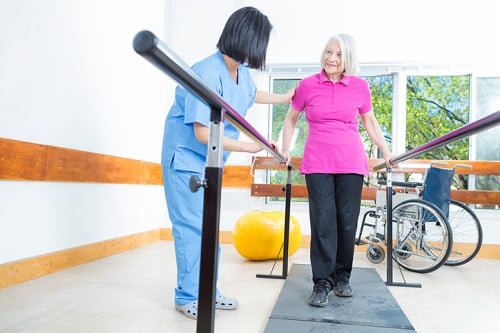The change will save the province millions, but forces seniors into a tough decision

Starting late November, Winnipeg will shift many publicly funded outpatient therapy services to the private sector — a move that’s expected to save the province $5 million over the next five years. According to advocates, that will be a problem for those who need hip and knee surgery.
A union representing physiotherapists has spoken out against the measure, saying that many people who need to undergo the procedure are seniors without health insurance. Because of that, they will be forced into a tough decision, reported CBC News.
“Can you afford the therapy following it, or not, or do you wish to spend the money on the therapy, or not, and that's going to make people decide whether or not they're even going to go through the surgery in the first place,” said Bob Moroz, president of the Manitoba Association of Health Care Professionals.
According to Moroz, well over 1,600 joint revisions — hip, knee, shoulder, and elbow — that were done in Manitoba required outpatient physiotherapy service in 2016. With that number of patients expected to be cut off from public funding, more will not be willing or able to access rehabilitative services. “You're increasing the chances of that person showing up at the hospital in need of more medical attention,” he said.
According to Jim Hayes, executive director of the Manitoba Physiotherapy Association, physiotherapy classes after total knee replacement surgery must continue. “To achieve that range of motion, there is physiotherapy expertise that is needed in order to guide the patients through that recovery process,” he stressed.
Such classes were previously available at all Winnipeg hospitals; private clinics are still working on developing those same classes.
Not all physiotherapy services will be cut off from public funding. The WRHA has released a list of clinical criteria for patients to receive outpatient therapy service when it’s centralized at the Health Sciences Centre. However, both Moroz and Hayes are calling for clarity on the list.
“I didn't understand 75% of what those conditions were,” said Moroz.
A spokesperson for the WRHA said that an appeals process will be available for patients that may not be eligible under the criteria, but whose cases include other factors that need to be considered. However, Moroz said the process still needs to be clarified.
“I've talked to our members too and they don't even know what this appeals process would be,” he said. “How do you complete it in a timely manner?”
Related stories:
Ex-CFL player’s plight reflects gap in athletes’ benefits
At least 197 management positions slashed from Manitoba healthcare system
A union representing physiotherapists has spoken out against the measure, saying that many people who need to undergo the procedure are seniors without health insurance. Because of that, they will be forced into a tough decision, reported CBC News.
“Can you afford the therapy following it, or not, or do you wish to spend the money on the therapy, or not, and that's going to make people decide whether or not they're even going to go through the surgery in the first place,” said Bob Moroz, president of the Manitoba Association of Health Care Professionals.
According to Moroz, well over 1,600 joint revisions — hip, knee, shoulder, and elbow — that were done in Manitoba required outpatient physiotherapy service in 2016. With that number of patients expected to be cut off from public funding, more will not be willing or able to access rehabilitative services. “You're increasing the chances of that person showing up at the hospital in need of more medical attention,” he said.
According to Jim Hayes, executive director of the Manitoba Physiotherapy Association, physiotherapy classes after total knee replacement surgery must continue. “To achieve that range of motion, there is physiotherapy expertise that is needed in order to guide the patients through that recovery process,” he stressed.
Such classes were previously available at all Winnipeg hospitals; private clinics are still working on developing those same classes.
Not all physiotherapy services will be cut off from public funding. The WRHA has released a list of clinical criteria for patients to receive outpatient therapy service when it’s centralized at the Health Sciences Centre. However, both Moroz and Hayes are calling for clarity on the list.
“I didn't understand 75% of what those conditions were,” said Moroz.
A spokesperson for the WRHA said that an appeals process will be available for patients that may not be eligible under the criteria, but whose cases include other factors that need to be considered. However, Moroz said the process still needs to be clarified.
“I've talked to our members too and they don't even know what this appeals process would be,” he said. “How do you complete it in a timely manner?”
Related stories:
Ex-CFL player’s plight reflects gap in athletes’ benefits
At least 197 management positions slashed from Manitoba healthcare system



